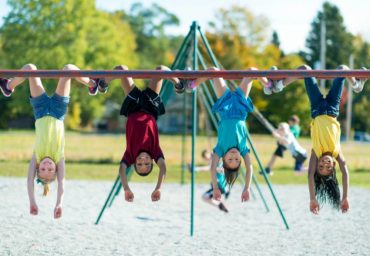
Whether it’s dance lessons, computer projects, art class or yoga, kids these days are busy bees. And while such activities are enriching and fun, experts say that many kids aren’t spending enough time doing something much simpler and every bit as important as structured programming: playing outdoors.
“Finding time for the kids to play outside can be such a challenge for parents,” says Keri Wilmot, a pediatric occupational therapist and an expert contributor to TheGeniusofPlay.org. “As a parent, I worry about ‘stranger danger’ or whether my kids will be able to navigate social issues on their own. Without spontaneity, playtime has lost some of it’s fun.”
Outdoor play is necessary for healthy child development, according to The Genius of Play. The initiative, whose mission is to raise awareness about the importance of play and help parents make play a critical part of raising their kids, says there are five benefits of unstructured outdoor playtime:
Physical Development
Research has shown that physically active kids tend to be leaner and healthier, while an inactive childhood can lead to a sedentary (and likely unhealthy) lifestyle in adulthood.
Furthermore, physical play builds gross and fine motor skills necessary for success in school and beyond. Hanging from the monkey bars, for instance, helps kids develop the hand muscles needed to grip a pencil.
Risk-Taking
Through outdoor play, children are given the opportunity to step outside their comfort zones and try new things. While taking risks won’t always lead to success on the first try, moments like a first bike ride without training wheels, or the first trip down the big slide in the playground, are critical for building the confidence and resilience needed to pursue a future career, start a business or handle life’s many challenges.
Social Skills
Childhood games played outdoors can help build social skills and teach kids to follow directions. From games as simple as tag, to those with more complicated rules — like “Kick the Can,” “Capture the Flag” and sports like soccer and basketball — communication, teamwork and other important social skills are developed during outdoor play.
Problem Solving
Children’s imaginations are often stimulated by the world around them. Being outside widens their horizons and can encourage kids to tap into their creativity in order to come up with solutions to challenges, such as learning how to build a sandcastle or figuring out how to climb up a jungle gym.
Reducing Stress
So much outdoor play involves physical activity, thrilling moments and a sense of freedom, all of which can boost endorphins, helping to lower stress levels and reduce anxiety and depression. Interestingly, simply touching dirt when creating mud pies or digging for worms can be beneficial.
According to a Bristol University study, certain types of “friendly” bacteria in soil have been found to activate the group of neurons that produce serotonin, which contributes to a feeling of well-being and happiness. So, don’t be afraid to let your kids get a bit dirty out there!
Playtime is essential for children. To promote health, happiness and confidence, be sure some of it is spent outdoors.
For play ideas, expert advice and other play resources, visit TheGeniusOfPlay.org.























